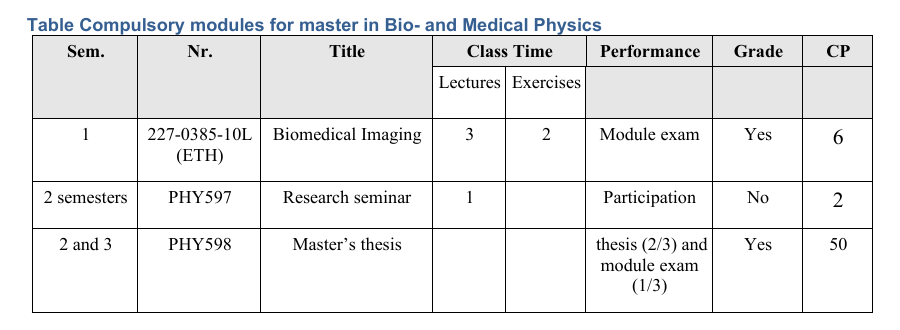Navigation auf uzh.ch
Navigation auf uzh.ch
Our researchers investigate biological systems from the scale of a single molecule to that of tissues and organisms. Thereby we gain information about e.g. molecular structure and the function of growth control regulated by mechanical forces and radiotherapy of cancers. Technically, the methods used and developed range from electron holography to magnetic resonance imaging and microscopy in turbid media.
Coordinator: Prof. J. Unkelbach
This master’s program offers an advanced education in astrophysics and cosmology. After introductory lectures, practice sessions and labs, students begin with their master’s thesis that should take 9 months.
The following research groups offer master theses:
Experiment: Groups Aegerter, Kozerke, Schneider, Schuler and Unkelbach

Research Seminar
Students are required to regularly attend a research seminar in bio- or medical physics during two semesters. (e.g. at the department for radio-oncology at the University Hospital, at the Paul-Scherrer Institute or at the Institute for Biomedical Engineering(seminars)).
The modules, worth 10 CP, are chosen from the list below depending on whether the focus is on biological or medical physics.
The remaining credit points missing from the total of 90 must be earned through elective modules. Whether a module will be awarded credit is determined individually in consultation with the supervisor of the Master’s thesis. For instance, we recommend: PHY475/476 Computational problems in medical physics and radiation oncology, PHY461 Experimental Methods and Instruments, STA404 Clinical Biostatistics, ESC411 Computational Science I, ESC403 Introduction to Data Science, PHY352 Continuum mechanics, BIO330 Modelling in Biology, BIO253 Experimental Techniques in Physical Biology, PHY431 Biology for Physicists
Compulsory courses of other master concentrations in physics may also be chosen. If you have any questions, please discuss the program with the coordinator of the master's program (Christof Aegerter) or the coordinator of the physics concentration Bio- and Medical Physics.
Compulsory modules: Nuclear and Particle Physics I (PHY211)
it is advised to attend these modules already during the BSc studies
In addition to these requirements, all students must discuss the courses they intend to complete with their master thesis advisor, who may set additional requirements.
The Guide to Physics Studies (PDF, 504 KB) provides comprehensive information about the Bachelor's and Master's programs.